初中英语语法之代词
- 格式:docx
- 大小:24.40 KB
- 文档页数:6

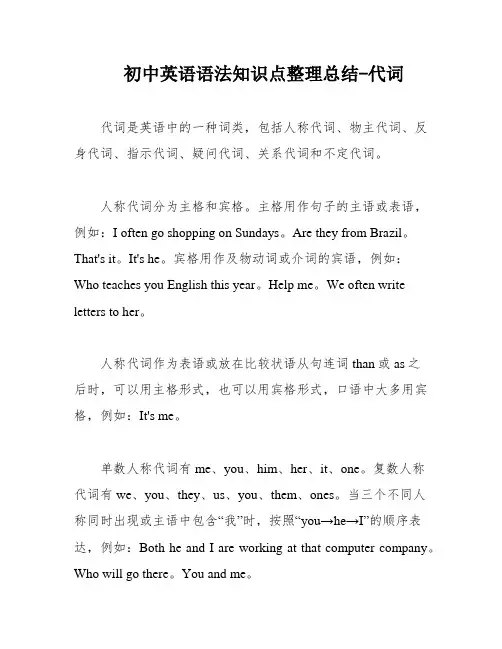
初中英语语法知识点整理总结-代词代词是英语中的一种词类,包括人称代词、物主代词、反身代词、指示代词、疑问代词、关系代词和不定代词。
人称代词分为主格和宾格。
主格用作句子的主语或表语,例如:I often go shopping on Sundays。
Are they from Brazil。
That's it。
It's he。
宾格用作及物动词或介词的宾语,例如:Who teaches you English this year。
Help me。
We often write letters to her。
人称代词作为表语或放在比较状语从句连词than或as之后时,可以用主格形式,也可以用宾格形式,口语中大多用宾格,例如:It's me。
单数人称代词有me、you、him、her、it、one。
复数人称代词有we、you、they、us、you、them、ones。
当三个不同人称同时出现或主语中包含“我”时,按照“you→he→I”的顺序表达,例如:Both he and I are working at that computer company。
Who will go there。
You and me。
人称代词it除了可以指人指物之外,还可以表示“时间、天气、温度、距离、情况”等含义,此外还可以作为“非人称代词”使用,替代作主语或宾语的不定式、动名词或名词性从句,例如:What's the weather like today。
It's fine。
What's the time。
It's 12:00.为反身代词的作用是强调动作的执行者与承受者是同一人或同一事物。
反身代词通常位于动词或介词后面。
如:I XXX XXX XXX(我在打篮球时弄伤了自己。
)He always talks to himself when he is alone。
(他独自一人时总是自言自语。
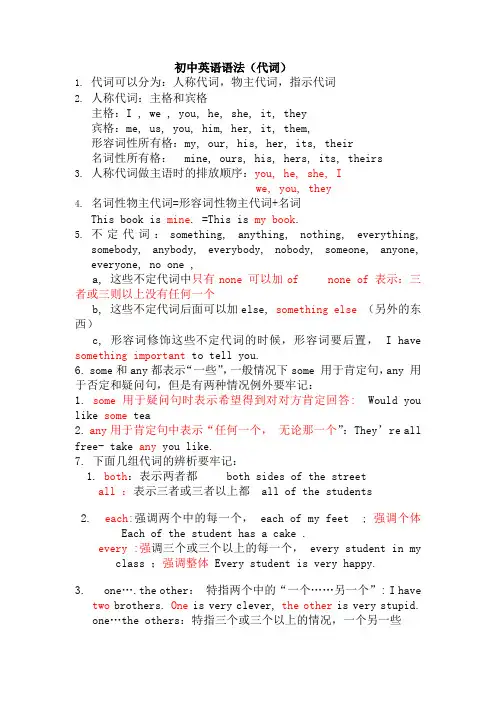
初中英语语法(代词)1.代词可以分为:人称代词,物主代词,指示代词2.人称代词:主格和宾格主格:I , we , you, he, she, it, they宾格:me, us, you, him, her, it, them,形容词性所有格:my, our, his, her, its, their名词性所有格: mine, ours, his, hers, its, theirs3.人称代词做主语时的排放顺序:you, he, she, Iwe, you, they4.名词性物主代词=形容词性物主代词+名词This book is mine. =This is my book.5.不定代词:something, anything, nothing, everything,somebody, anybody, everybody, nobody, someone, anyone, everyone, no one ,a, 这些不定代词中只有none 可以加of none of 表示:三者或三则以上没有任何一个b, 这些不定代词后面可以加else, something else (另外的东西)c, 形容词修饰这些不定代词的时候,形容词要后置, I have something important to tell you.6. some和any都表示“一些”,一般情况下some 用于肯定句,any 用于否定和疑问句,但是有两种情况例外要牢记:1. some用于疑问句时表示希望得到对对方肯定回答: Would you like some tea2.any用于肯定句中表示“任何一个,无论那一个”:They’re all free- take any you like.7. 下面几组代词的辨析要牢记:1. both:表示两者都 both sides of the streetall :表示三者或三者以上都 all of the students2. each:强调两个中的每一个, each of my feet ; 强调个体Each of the student has a cake .every :强调三个或三个以上的每一个, every student in my class ;强调整体Every student is very happy.3. one….the other:特指两个中的“一个……另一个”: I havetwo brothers. One is very clever, the other is very stupid.one…the others:特指三个或三个以上的情况,一个另一些There are four boys in the classroom. One is reading. The others are talking.one…the other +名词:特指三个或三个以上的情况,一个另一些There are four boys in the classroom. One is reading. The other boys are talking.4. some…the others:/some…others 在一个特定的范围内,“一些……,别的一些”The students are busy with the experiment. Some are operating the machine. The others are recording the results.5. one…another…the other/one…another…the third :表示列举三个人或三样事物The old woman has three daughters.One is in China.Another is in America. The other is in France.6.each other:表示两者中的相互After the tennis match, the two players shook hands with each other.one another:表示三者,三者以上的相互After the football match, all the players shook hands with one another.。
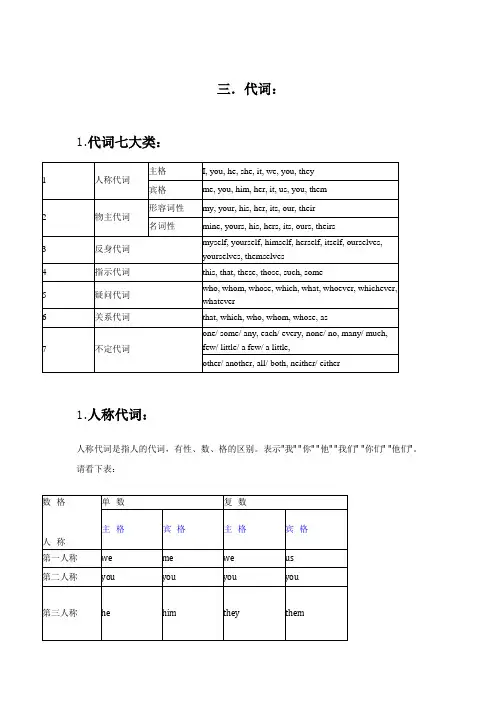
三.代词:1.代词七大类:1人称代词主格I, you, he, she, it, we, you, they宾格me, you, him, her, it, us, you, them2物主代词形容词性my, your, his, her, its, our, their名词性mine, yours, his, hers, its, ours, theirs3反身代词myself, yourself, himself, herself, itself, ourselves, yourselves, themselves4指示代词this, that, these, those, such, some5疑问代词who, whom, whose, which, what, whoever, whichever, whatever6关系代词that, which, who, whom, whose, as7不定代词one/ some/ any, each/ every, none/ no, many/ much, few/ little/ a few/ a little,other/ another, all/ both, neither/ either1.人称代词:人称代词是指人的代词,有性、数、格的区别。
表示"我" "你" "他" "我们" "你们" "他们"。
请看下表:数格人称单数复数主格宾格主格宾格第一人称we me we us第二人称you you you you 第三人称he him they themshe herit it(1)人称代词主格在句中作主语。
例如:She is my English teacher.(2)宾格在句中作宾语。
例如:They don't want me to go there alone.Don't worry. I can look after her.(3)宾格还可以作宾格。

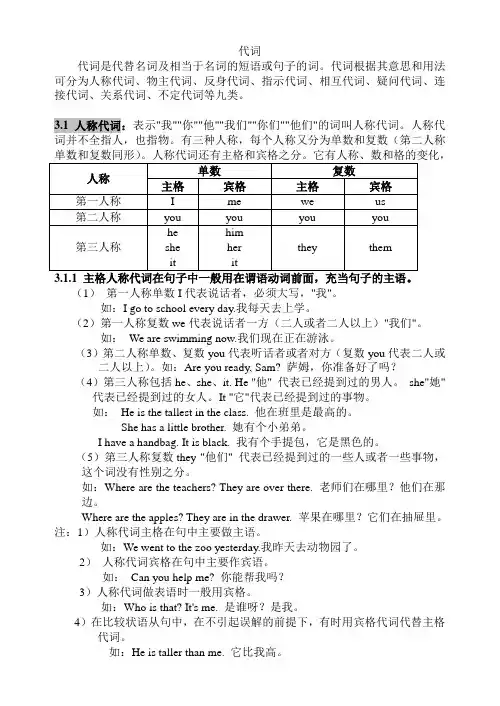
代词代词是代替名词及相当于名词的短语或句子的词。
代词根据其意思和用法可分为人称代词、物主代词、反身代词、指示代词、相互代词、疑问代词、连接代词、关系代词、不定代词等九类。
3.1 人称代词:表示"我""你""他""我们""你们""他们"的词叫人称代词。
人称代词并不全指人,也指物。
有三种人称,每个人称又分为单数和复数(第二人称(1)第一人称单数I代表说话者,必须大写,"我"。
如:I go to school every day.我每天去上学。
(2)第一人称复数we代表说话者一方(二人或者二人以上)"我们"。
如:We are swimming now.我们现在正在游泳。
(3)第二人称单数、复数you代表听话者或者对方(复数you代表二人或二人以上)。
如:Are you ready, Sam? 萨姆,你准备好了吗?(4)第三人称包括he、she、it. He "他" 代表已经提到过的男人。
she"她"代表已经提到过的女人。
It "它"代表已经提到过的事物。
如:He is the tallest in the class. 他在班里是最高的。
She has a little brother. 她有个小弟弟。
I have a handbag. It is black. 我有个手提包,它是黑色的。
(5)第三人称复数they "他们" 代表已经提到过的一些人或者一些事物,这个词没有性别之分。
如:Where are the teachers? They are over there. 老师们在哪里?他们在那边。
Where are the apples? They are in the drawer. 苹果在哪里?它们在抽屉里。
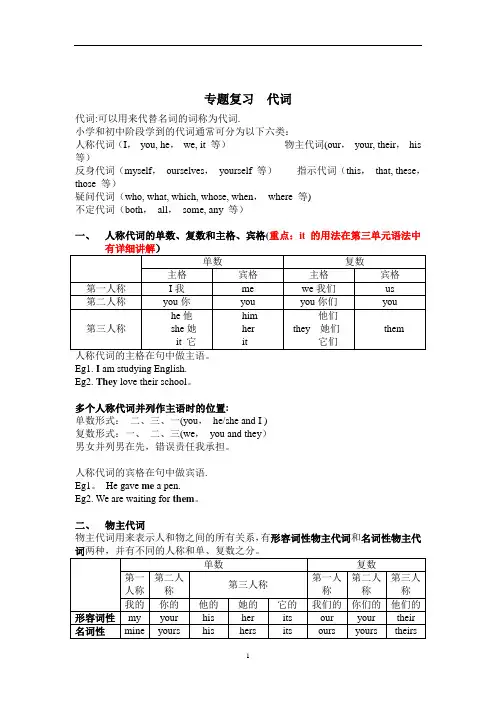
专题复习代词代词:可以用来代替名词的词称为代词.小学和初中阶段学到的代词通常可分为以下六类:人称代词(I,you, he,we, it 等)物主代词(our,your, their,his 等)反身代词(myself,ourselves,yourself 等)指示代词(this,that, these,those 等)疑问代词(who, what, which, whose, when,where 等)不定代词(both,all,some, any 等)一、人称代词的单数、复数和主格、宾格(重点:it的用法在第三单元语法中Eg1. I am studying English.Eg2. They love their school。
多个人称代词并列作主语时的位置:单数形式:二、三、一(you,he/she and I )复数形式:一、二、三(we,you and they)男女并列男在先,错误责任我承担。
人称代词的宾格在句中做宾语.Eg1。
He gave me a pen.Eg2. We are waiting for them。
二、物主代词物主代词用来表示人和物之间的所有关系,有形容词性物主代词和名词性物主代形容词性物主代词不能单独使用,只做定语,用来修饰其后的名词。
Eg1。
My parents are both doctors.Eg2。
There’s something wrong with his bike.名词性物主代词应独立使用,后面不跟名词,相当于形容词性物主代词+名词,在句中可以作主语、宾语或标语.Eg1. Our classroom is on the second floor,and theirs is on the fourth floor. (作主语) Eg2。
Let's clean their room first, and then clean ours. (作宾语)Eg3。

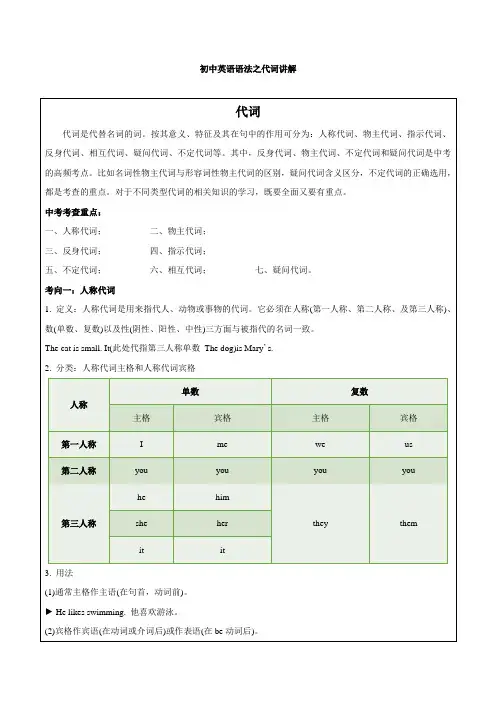
初中英语语法之代词讲解2. 用于询问天气或品行:What be+主语+like?► What’ s the weather like? 天气怎么样?3. 用于询问外貌、长相:What do/does/did+主语+look like?► What does she look like? 她长什么样?4. 征求对方的意见:What about ...?► What about going out for a movie? 出去看电影怎么样?—____________ are you going to buy for your father for Father’ s Day?—A T-shirt.A. WhatB. WhenC. WhereD. How【答案】A【解析】分析句子结构可知,空处要填的疑问词作动词buy的宾语,选项中只有A项可以作宾语。
故选A。
1. —Have you found your lost mobile phone?—No, I haven’t found ____________, but I bought ____________ this morning.A. one;thatB. that;oneC. it;oneD. one;it2. She got up to get some sleeping pills but found there was ____________ left at home.A. nothingB. noneC. somethingD. nobody3. —Mike, where’s today’s newspaper?—Well, you don’t need to read it because there is ____________ in it.A. something interestingB. nothing specialC. important thingD. anything new4. —Let’s go to see a film this weekend, can we go on Saturday or Sunday?—____________ is OK. I’ m not free at weekends.A. NeitherB. EitherC. EveryD. Each5. The song I Believe I Can Fly tells us that believing in ____________ is very important.A. themselvesB. itselfC. ourselvesD. yourselves6. My dad is my role model. I learn a lot from ____________.A. itB. himC. herD. them1. C 【解析】句意:——你找到你丢失的手机了吗?——没有找到,但是今天上午我买了一个新的。

初中英语语法代词讲解Newly compiled on November 23, 2020初中英语语法代词代词:为了避免重复而用来代替其他词的词。
种类:1) 人称 2) 物主 3) 反身4) 指示 5)不定6) 疑问7) 相互代词:each other, one another互相,其所有格加-’s8) 关系代词:which, who,that,whom,whose等引导定语从句9) 连接代词:who, whom, whose, what, which, whatever, whichever, whoever, whomever10)替代词:one(单数), ones(复数)用于替代前面出现的同类事物。
但ones必须和形容词连用。
如果替代的名词时无形容词在前,则用some, any,而不用ones。
如:Have you bought any rulers Yes,I 've bought some.一、人称代词1.人称代词的形式2.人称代词的句法功能3.人称代词的排列顺序(单数231,复数123)当两个以上的人称代词一起作主语时,单数按二、三、一人称排列(即you, he / she, I);复数按一、二、三人称排列(即we, you, they)。
但是如果做错了事需要承担责任时,要把说话人(I)放在第一位。
如:It was I and John that made her angry. 是我和约翰惹她生气了。
二、物主代词1.物主代词的形式2.物主代词的基本用法3.物主代词的特殊用法在双重所有格中只能用名词性物主代词。
如:我的一个朋友a friend of mine ,她的一个同学 a classmate of hers , each brother of his.三、反身代词1.反身代词的形式反身代词又叫自身代词,表示动作返回到动作发出者本身。
2.反身代词的句法功能3.由反身代词构成的习惯用语①help oneself to 随便吃……②come to oneself 苏醒过来,醒悟,恢复知觉③dress oneself 自己穿衣服④say to oneself 自言自语⑤enjoy oneself 玩得开心⑥lose oneself in迷路于,全神贯注于…之中,消失于⑦teach oneself 自学⑧look after oneself ⑨by oneself 亲自learn……by oneself 自学…leave one by oneself 把某人单独留下hurt oneself 伤了自己make yourself/yourselves at home 不必拘束四、指示代词1. that 用来代替前面提到的不可数名词,those代替复数名词。

初中英语语法——代词代词(pron.)的含义是:代替名词,兼有名词和形容词的作用代词包括:人称代词,物主代词,反身代词类别:主格宾格形容词性物主代词名词性物主代词反身代词第一人称单数单数:I me my mine myself 复数:we us our ours ourselves第二人称单数:you you your yours yourself 复数:you you your yours yourselves第三人称单数:he him his his himself she her her hers herself it it its its itself 复数:they them their theirs themselves1.人称代词A.人称代词it的特殊用法:一般it指“它”,但在表示天气、时间、距离等时,用it来代替,此时的it并不译为“它”。
B.当三个人称代词(单数)同时出现时,其先后顺序为you,he,I。
而复数一般采用we,you,they顺序。
2.物主代词A.形容词性物主代词后面一定要跟上一个名词。
B.名词性物主代词可作主语、表语、宾语。
3.反身代词1)反身代词的构成分两种:第一、二人称反身代词在形容词:性物主代词后加上self或selves,第三人称的反身代词在宾格代词后加上self或selves.2)反身代词的用法:一种是作宾语,由主语发出的动作又回到动作者本身。
如:I enjoyed myself at the party.另一种是作名词或代词的同位语;用来加强语气。
如:I can do it myself.3)初中阶段由反身代词构成的常用词组有:enjoy oneself,help oneself to,learn by oneself,teach oneself,(all)by oneself,leave...by oneself,lose oneself in等,在运用反身代词时,应注意它在数、性别上与哪一个保持一致。
初中英语语法专题讲座——代词【复习要点】代词是代替名词的词或者起名词作用的短语和句子的词。
英语中代词有人称代词、物主代词、反身代词、指示代词、疑问代词、关系代词、不定代词。
一、人称代词:1.人称代词的形式:英语中有以下这些人称代词:说明:⑴. 人称代词有主格和宾格之分,主格在句中一般用作主语、表语等,宾格在句中用作动词的宾语和介词的宾语。
⑵. 人称代词单数he, she 和it的复数形式都是they,宾格形式也相同,为them。
⑶. 第三人称的人称代词分阳性he / him,阴性she / her 和中性it /it,复数只有一个they / them,不分性别。
2.人称代词的基本用法:⑴. 主格人称代词用作主语或表语,例如:If he writes to you, you must write back. 如果他给你写信,你必须回复。
(用作主语)It wasn’t she who broke the window. 打破窗子的不是她。
(用作表语)在口语中,人称代词如果作表语,通常用宾格形式。
例如:Who is it? It’s me (us). 是谁呀?是我(我们)。
⑵. 宾格人称代词用作宾语(动词宾语和介词宾语)。
例如:Tell her to call me tomorrow, please. 请叫她明天给我打电话。
(用作动词宾语)I don’t want to put them under the table. 我不想把它们放在桌底下。
(用作介词宾语)人称代词独立使用时也用宾格形式,例如:I’d like to go back in here.— Me too. 我想回到这里来。
—我也想。
以下两句中的人称代词用主格和宾格都可以,用主格被认为较正式,用宾格为口语说法。
例如:My sister is two years older than I (am) / me. 我姐姐比我大两岁。
You are as tall as he (is) / him. 你跟他个子一样高。
外教一对一初中英语语法大全 -代词语法要点代词(pronoun)是替代名词或名词短语的词。
例如:I 我you 你he 他we 我们 they 他们it 它代词的种类很多,有人称代词、物主代词、反身代词、相互代词、指示代词、疑问代词、关系代词和不定代词。
代词在句子中可以作主语、宾语、表语或定语。
一、代词的种类和意义代词分为人称代词、物主代词、反身代词、相互代词、指示代词、疑问代词、关系代词和不定代词。
二、代词详解1. 人称代词人称代词有三种人称,分别叫第一人称、第二人称和第三人称,各人称都有单、复数形式,同时还有主格和宾格之分。
人称代词(主格、宾格)在句子中的作用人称代词的主格形式在句子中作主语;宾格形式在句子中作宾语,可作动词的宾语,也可作介词的宾语;如果跟在连系动词的后面,它们还可以作表语。
外教一对一 人称代词有时还可以指代“人”以外的其他事物。
这种用法很像我们汉语修辞中的“拟人”手法,有一定的感情色彩。
以she为例,在特定的语境中,“她”可以指代moon(月亮),sea(海洋),earth(地球),country(国家),peace(和平),等等。
两个或三个单数的人称代词并列连用时,其规则与汉语不同。
汉语说“我和你”、“我和他”,英语则说“you and I”、“he and I”;汉语说“我你他”,英语则说“you,he and I”。
而复数人称连用时,规则和汉语基本一致:“我们和你们”说“you and we ”,“我们和他们”说“we and they”,“我们,你们和他们”说“we,you and they ”。
人称代词it除了作“它”解之外,还可以指代多种“人”、“事”、“物”。
2. 物主代词物主代词有形容词性物主代词和名词性物主代词两种。
物主代词的用法形容词性物主代词均表示“某人的”或“某物的”,用在名词之前,作该名词的定语;名词性物主代词用于一定的语境中,用来代替前面提到的人或事物,具有名词性质,在句子中可以有部分名词的作用,因此可以作主语、宾语和表语。
代词:英语中代词有人称代词、物主代词、反身代词、指示代词、疑问代词、关系代词、不定代词。
一).人称代词:人称单数复数主格宾格主格宾格第一人称I me we us第二人称you you you you第三人称hesheithimheritthey them通称one ones1、主格用来做句子的主语、表语。
如:I often go shopping on Sundays.(星期天我常去购物)Are they from Brazil?(他们是巴西人吗?)That’sit.(就那么回事) / It’she!(是他!)2、宾格用来做及物动词或者介词的宾语如:Who teaches you English this year?(今年谁教你们的英语?)Help me!(救救我!) / We often write letters to her.(我们常给他写信)3、人称代词作表语或者放在比较状语从句连词than或as之后时,可以用主格形式,也可以用宾格形式,口语中大多用宾格。
如:–It’sI/me.(是我。
)三个不同人称同时出现,或者主语中包含“我”时,按照“you→he→I”的顺序表达。
如:Both he and I are working at that computer company.(我和他都在那家电脑公司上班) –Who will go there?(谁要去那儿?) –You and me.(你和我)4、人称代词it除了可以指人指物之外,还可以表示“时间、天气、温度、距离、情况”等含义,此外还可以作“非人称代词”使用,替代作主语或者宾语的不定式、动名词或者名词性从句。
fine.(天气晴好) / 如:--What’s the weather like today?(今天天气怎样?)—It’s:00.(12点)--What’s the time?(几点啦?) –It’s 12a long way to go.(那可要走好长的路) / It took him three days to clean his house.It’sIt is very clear that the public want to know when these men can go into space.(很显然,公众想知道这些人什么时候能进入太空)We found it very difficult to learn a foreign language well.(我们发觉要学好一门外语是非常困难的)二).物主代词:人称单数复数名词性形容词性名词性形容词性第一人称my mine our ours第二人称your yours your yours第三人称his her its his hers its their theirs通称one's1、形容词性物主代词只能作句子中名词的修饰语,后面要跟名词。
代词单数复数1 人称代词主格I you he she it we you they 宾格me you him her it us you them2 物主代词形容词性my your his her its our your their名词性mine yours his hers its ours yours theirs3 反身代词myself yourself himself herself itself ourselves yourselves themselves4、指示代词this、that、these、those在句中可以充当主语,宾语,表语和定语其中this和that为单数,these和those为复数。
指示代词在句中可以作主语、宾语、表语、定语。
比较和用法:(1)this和these指近的事物;that和those指远的事物。
(2)介绍放在一起的两样东西时,先介绍的用this,后介绍的用that.(3)电话用语:this指代自己,that指代对方。
向对方介绍自己时用This is …询问对方是哪一位时,用who’s that?(你是谁?) Is that …?(是……吗?)(4)that 和those常常用来代替提到过的名词,以避免重复。
The apples on the floor are bigger than those in the basket.地板上的苹果比篮子里的更大。
5、疑问代词who(谁)whom (谁,是who的宾格)whose(谁的)Which(哪一个,既可指人,也可指物) what(什么)6、不定代词不指明代替任何特定名词的代词叫不定代词。
英语中的不定代词有:some,any,no,all,every,each,other,another,either,neither,both,many,much,few, little, afew, a little, a lot of, lots of, a great deal, a great many等。
复合不定代词:由every, some, any, no 与-one, -body, -thing构成的代词指人指人指物every- everyone everybody everythingsome- someone somebody somethingany- anyone anybody anythingno- no one nobody nothing(其中-one和-body构成的不定代词可以互换使用,只是前者较文雅)不定代词的用法和比较:(1)Much、some和any:1.some-类复合不定代词主要用于肯定句中,any-类不定代词主要用于否定句、疑问句或条件句中。
2. some用于疑问句中,表示盼望得到肯定得答复或建议、请求等。
Would you like some bananas?3.any 用于肯定句中有“任何一个” 解。
常用于比较级句子中。
Tom runs faster than any other boy in his class.(2)no one和none:no one指代人,只能为可数,回答whonone 可指代人或物,可数、不可数皆可,回答how many/much, none 可与of 结构连用。
None of them knows the answer to the question.没有一个人知道那个问题的答案。
(3)every和eachevery 用于三个或三个以上的人或物,侧重全体。
each一般用于指两个或两个以上的人或物,侧重每一个。
另外,each和every均常修饰单数可数名词。
Every student want s to see that film.所有的学生都想去看那场电影。
Each child get s one apple.每个孩子都得到了一个苹果。
(4)both, either和neitherboth两者都谓语动词用复数either两者中的任何一个谓语动词用单数neither两者都不谓语动词用单数Both of my parents know English./both A and B areEither of my parents knows English.Neither of my parents know s English.either用作副词,用于否定句中作“也”解释,通常置于末尾。
相当于肯定句中的too,用在句末时,either前要加逗号(5)one, another ,the other,other1. one 常用来作代词,替代前文所出现的可数名词,表示人或物,以避免重复。
例如:I haven't got a ball pen. I'll have to buy one. (= a ball pen)我没圆珠笔,我得去买一支。
2. the other, another 都可解释为“另一个”。
other 加上定冠词用于两者中的另一个(注意,不一定是两个,可能是两堆,其中一堆,另外一堆。
总之是两者),another 指三者以上中的另一个。
例如:He has two brothers. One is a doctor, the other is a teacher.(只有两个)He has three brothers. One is a doctor, another is a teacher, and the third is a writer.(两个以上,有第三者的)3.other-其后要加名词复数,表示另外的,其他的,例如:Did you see any other old friends?你还看见其他的老朋友吗?4.others-别人,别的东西,后面不加宾语了(就是后面不加名词),常用some…others…一些…另一些Some went shopping,others went swimming.(5) little, a little 和few, a few1. little 与a little 两者都用来修饰不可数名词little 作“很少”,“几乎没有” 解,有否定的意思,a little 作“少许”、“有一点” 解,有肯定的意思2. few, a few 用来修饰可数名词,前者表示否定,后者表示肯定。
3.常用词组有quite a few (好几个),only a few (只有一个),a very few (极少数)。
例如:He studied English for quite a few years. 他学汉语已有好几年了。
【经典题例】1. —Whose notebook is it?—It belongs to Lily. Didn’t you see name on it?A. sheB. herC. hers【解析】选B。
其后是名词name, 那么此处应用形容词性物主代词。
2. —What is a cool job?—I would say “a good job”is you would do even if you didn’t get paid forit.A. oneB. whichC. whyD. that【解析】句意为: 我说“一份好工作”是即使得不到报酬也愿意做的工作。
此处缺少代词, 代替“工作”, 故选A。
one 可代替前面提到的人或物。
3. I asked her for ink, but she didn’t have .A. any; someB. any; anyC. some; anyD. some; some【解析】选C。
这是一个并列句, 前一句表示肯定, 后一句表示否定。
【实战演练】1. I’ve got many books on Chinese food. You can borrow if you like.A. eitherB. oneC. itD. every2. My aunt has two children. But of them lives with her.A. eachB. neitherC. eitherD. both3. —Sonia, is this your dictionary?—Oh, no, it’s not . Ask Li Lei, he is looking for .A. me; hersB. mine; himC. my; herD. mine; his4. — are you going to the concert with this weekend?—My cousin. I’m sure we will enjoy .A. Whom; ourselvesB. Who; usC. Whom; myselfD. Who; herself5. The number of students in my class is the same as in .A. she’sB. sheC. herD. hers6. —Who is singing in the classroom?— must be Susan.A. SheB. ItC. ThisD. He7. We need some more coffee. There is only left.A. littleB. a littleC. fewD. a few8. I have to do. Please give me to read.A. something; anythingB. nothing; somethingC. nothing; everythingD. anything; nothing9. This exercise is difficult .A. so; that few of us can doB. so; that few of us can do itC. too; for anyone of us to doD. too; for anyone of us to do it10. Some of the stickers belong to me, while the rest are .A. him and herB. his and herC. his and hersD. him and hers答案:1. 选B。
one 和it 都可以用来代替上文中提到过的人或物。
one 代替上文中所提到的人或物中的某一个, 而it 代替上文中所提到的那个人或物。
根据句意,“如果你喜欢我的这些书, 你可以借一本”。